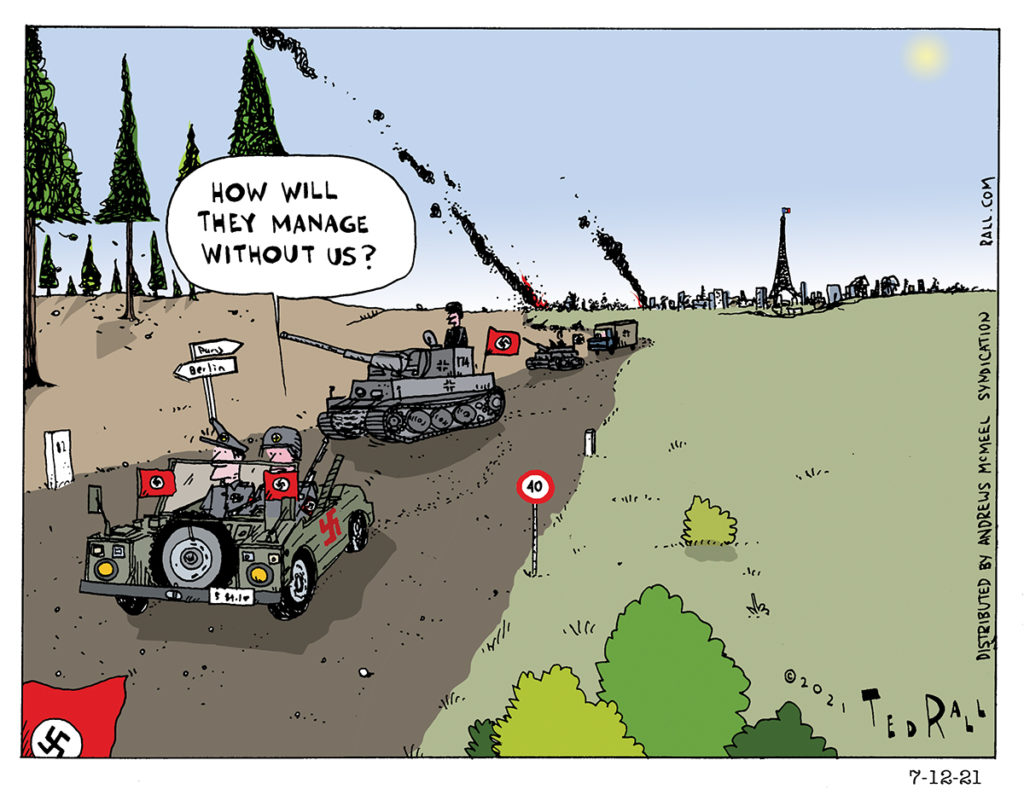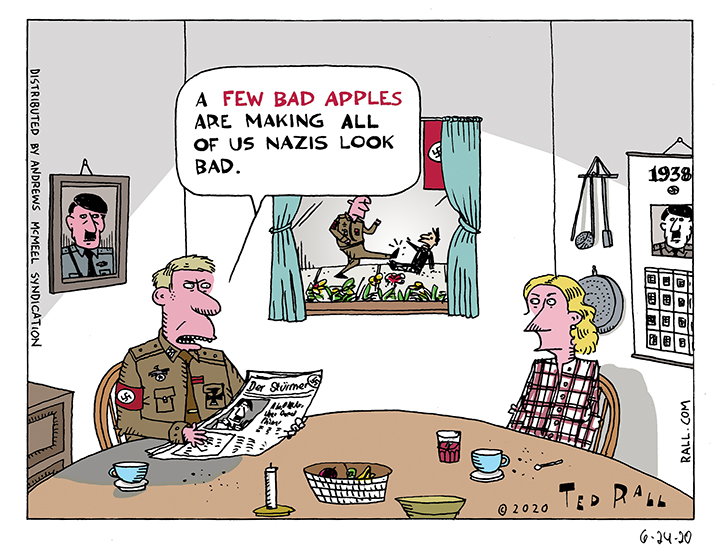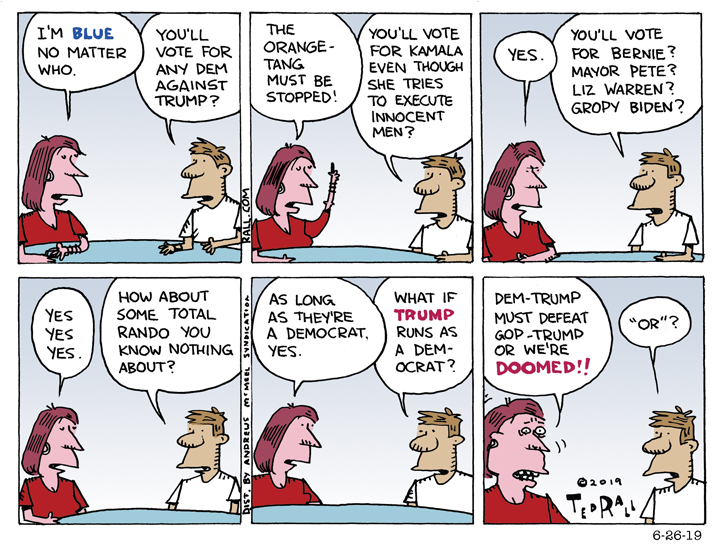Democrats’ idea of “resistance” to Trump is considerably less substantial than actual resistance to fascism looked like during World War II. And it probably shouldn’t have started with a unanimous vote for neoconservative maniac Marco Rubio.
TMI Show Ep 85: Germany’s Politics Move Right. What Could Go Wrong?
Live at 10 am Eastern/9 am Central time, and Streaming 24-7 Thereafter:
When German politics shift to the Right, the world gets nervous. German’s Alternative for Germany (AfD) Party came in second in parliamentary elections, largely on the strength of German anger over the economy and anti-migration nativist sentiment. Has AfD peaked out? Does this presage results in France and other European countries? How should we feel and respond to the right of the German Right?
On today’s episode of “The TMI Show,” Ted Rall and Manila Chan discuss the AfD’s victory in Germany.
Trump Grabs at a Presidency of Intentionality
 There are two kinds of leaders: managers and revolutionists.
There are two kinds of leaders: managers and revolutionists.
Most American presidents are managers. Managers have small ambitions, often so small as to be immeasurable. They may or not think that the organization that they’re taking over requires a few nips or tucks, but they believe that the fundamentals are sound. The main ambition of these incrementalists is to attain their position. The moment their buttocks sink into the big chair behind the big desk, they have fulfilled their biggest goal.
It is easy to identify a managerial president during a time of crisis. No matter how bad things get and how angry voters become, managers are loathe to change much. They govern as though continuity were a given.
Jimmy Carter and Barack Obama, both consummate technocrats, assumed the nation’s highest office during periods of economic upheaval. Yet they did not follow the example of Franklin D. Roosevelt, a revolutionist, by introducing major plans or anti-poverty bills to try to alleviate inflation or high unemployment. George H.W. Bush, whose decades in Washington inclined him to even less ambition than outsiders like Carter and Obama, had no discernible plans for the country before moving into the White House in 1989 beyond, like Peter Sellers, just being there. We were mired in recession throughout his term and he did nothing.
Whatever you think about him or his politics, give this to Donald Trump: he has launched his second term with the biggest intentionality of any president since Ronald Reagan. Clearly having learned from his experience following his first surprise win that political capital ebbs away after inauguration as quickly as a new car loses value, and possibly inspired by the historical benchmark of FDR’s first 100 days, Trump is coming out of the gate with grandiose gestures intended to signal great ambitions that deliver on his long list of dramatic campaign promises.
The crisis at the U.S.-Mexico border became a top issue for Trump in 2024. And so, within hours of his restoration, he declared an emergency that allowed him to send in military troops, shut down the app used by asylum applicants, declared drug cartels terrorists, tried to end birthright citizenship and, for good measure, demanded that the Gulf of Mexico be renamed. Much of these moves are objectively stupid—birthright citizenship is guaranteed by the Constitution, drug runners aren’t terrorists, the number of unauthorized border crossings fell precipitously after Biden basically closed it last summer and let’s not even think about the “Gulf of America”—but you can’t say they’re the small-bore triangulation crap Bill Clinton picked up from Dick Morris, like lower prescription drug prices for seniors, lower student loan interest rates and kneecapping Sister Souljah. And mass deportations are still on the way. If you voted for Trump due to the border crisis, you’re happy.
Why do we have more managerial than revolutionary presidents? Revolution is hard.
We are barely days into Trump 2.0 yet the challenges are already starting to become apparent. The president’s attempt to McKinsey-ize the federal government into fiscal austerity, the non-actual-departmental Department of Government Efficiency, lost one of its touted pair of pet billionaires less than seven hours after the inauguration when Vivek Ramaswamy pulled out, supposedly to explore a quixotic run for Ohio governor.
Trump can’t help the fact that personnel are unpredictable. But he is responsible for a major oversight in whatever vision he may be pursuing: he has yet to articulate a unified theme for the sweeping changes he presumably intends. FDR did this with characteristic effectiveness in his 1933 inaugural address. Confronting high unemployment at the nadir of the Depression, he said: “Our greatest primary task is to put people to work.”
“This is no unsolvable problem if we face it wisely and courageously,” Roosevelt continued. “It can be accomplished in part by direct recruiting by the Government itself, treating the task as we would treat the emergency of a war, but at the same time, through this employment, accomplishing greatly needed projects to stimulate and reorganize the use of our national resources.” Much of what followed (the Civilian Conservation Corps, the Public Works Administration and the Tennessee Valley Authority) fell into the justification for direct job creation by the federal government and helped sell it to the public and Congress.
To the extent that Trumpism is similar to 20th century fascism, it’s that it’s an ideology devoid of internal consistency beyond its point of origin, Donald Trump’s mouth. Under Nazi Germany’s “Führer Principle,” Hitler not only enjoyed the full power of law by making an utterance, but was considered to have created a cogent ideology simply because whatever he believed and ordered came from him. This was, of course, irrational to an extreme and internally inconsistent. For a time, under absolute totalitarian dictatorship, however, Hitler’s cult was sustainable.
Crippled and fake as our democracy is, Americans are still a harder sell than mid-century Germans. In the not so long run, whether Trump succeeds will depend on whether he is able to compose a credible and consistent narrative of what he’s attempting to achieve, as Ronald Reagan did when he downgraded the influence of liberalism within government and elevated the glories of individualism. Saying that everything you do puts America first simply because you said it, won’t cut it.
After decades of managerial presidents who refused to engage with how angry and miserable most of us ordinary citizens have been, it will be interesting, and not a little frightening, to watch this would-be revolutionist.
(Ted Rall (Twitter: @tedrall), the political cartoonist, columnist and graphic novelist, co-hosts the left-vs-right DMZ America podcast with fellow cartoonist Scott Stantis and The TMI Show with political analyst Manila Chan. His latest book is the graphic novel 2024: Revisited.)
The Final Countdown – 8/15/24 – Trump Blasts Kamala Over State of U.S. Economy
 On this episode of The Final Countdown hosts Ted Rall and Steve Gill discuss a variety of topics, including Trump’s economic policy speech.
On this episode of The Final Countdown hosts Ted Rall and Steve Gill discuss a variety of topics, including Trump’s economic policy speech. The Final Countdown – 10/7/23 –
Mark Sleboda – International Relations and Security Analyst
Here’s What a Progressive Platform Looks Like

“Be realistic. Demand the impossible.” —Situationist slogan, 1968.
Demand #1: The $30-per-hour Minimum Wage.
Not phased in over so many years that today’s $30 is worth $20 by the time it takes effect. $30 an hour for all workers, no exceptions, now. This is an eminently reasonable demand. If anything, it’s too little to ask. $7.25 is a sick joke. Congress’ abdication of its moral duty to reward American workers for their extraordinary productivity by increasing the minimum wage at or faster than inflation has eroded the base salary since the Vietnam era. Corporate profits have soared as workers’ wages have stagnated.
The federal minimum wage was $1.60 in 1968. Adjusting for the official inflation rate, that’s $30.00 today. Let’s party like it’s 1968.
Demand #2: Free national healthcare.
Not market-based, not a hybrid—we need real, actual, universal healthcare. Every nurse and every doctor becomes a federal employee. Health insurance vanishes as a business sector. Every check-up, every test, every doctor’s visit, every medication, every surgical procedure is fully covered, no questions asked, as long as it’s approved by a physician.
This is not too much to ask. Germany, where only 0.5% of the population is uninsured, pays only 10.7% of GDP for healthcare, compared to 16% here in the U.S. Norway, where hospitals are operated by the government, has a $210 per citizen per year deductible after which the government picks up the tab for everything; like Germany, overall healthcare costs in Norway are about 60% of ours.
Throw in dental, vision and mental health.
Demand #3: Slash military spending by 80%.
We’re not the world’s policeman. We’re its deranged serial killer. The U.S. squanders $800 billion a year to invade, occupy, assassinate, intimidate and bomb people who mean us no harm and destroy their infrastructure. That’s more than the next nine biggest-spending militarist nations combined. And those countries total 10 times our population.
Slashing the Pentagon budget would make the world safer. Fewer U.S. wars and proxy wars would reduce anti-Americanism and thus reduce the chance of another terrorist attack, save thousands of American lives and millions of people overseas, not to mention massively helping out the environment.
Those savings would easily cover…
Demand #4: Free four-year college.
Young Americans have long been coerced into a devil’s bargain: without a college degree, they’ve been told, you won’t land a decent-paying job. College is insanely expensive so you’ll have to accept the burden of student loan debt. If you don’t make enough money after graduation due to bad luck or a bad economy or a changing workplace, too bad, you still have to pay. You can’t even discharge the loans in bankruptcy.
If the corporations who own our politicians require job applicants to have a college degree, a college degree should be free. 39 countries have free college. We deserve, and can afford, the same as Kenya, Iceland and Panama.
Demand #5: Leadership to ban the most frightening weapons.
As the world’s most aggressive militaristic nation and its biggest international arms dealer, only the U.S. has the standing and power to stop the arms races we’re starting. The U.S. should forswear its currently-stated, insane option of launching a nuclear first strike and invite all other nuclear powers to make the same commitment. It should join the 80% of the world’s nations that have pledged not to use landmines. It should ban drone-based weapons in its military, police and civilian sectors and demand that other nations do the same. The world must come together to ban lethal autonomous weapons; the U.S.’ early lead in this technology gives it leverage to lead the way.
More to come.
(Ted Rall (Twitter: @tedrall), the political cartoonist, columnist and graphic novelist, co-hosts the left-vs-right DMZ America podcast with fellow cartoonist Scott Stantis. You can support Ted’s hard-hitting political cartoons and columns and see his work first by sponsoring his work on Patreon.)
How Will They Manage without Us?
As the United States completes its pullout from Afghanistan, the usual suspects worry aloud that the country won’t be able to manage without us. What they and other people with a neo-colonialist mentality don’t realize is that Afghanistan is a sovereign country and that we have been interfering with it unnaturally for 20 years.
A Few Bad Apples
It’s one of the most common shibboleths in our culture: only a few “bad apples” among the police are responsible for the abuse. And while it is true that police abuse seems to be concentrated by certain policemen, it’s also true that the entire system is completely corrupt. That goes double when you consider the cult of silence in most police departments.





